Berlin Marathon
The Berlin Marathon (German: Berlin-Marathon, pronounced [bɛʁˈliːn ˈmaʁatɔn]) is a marathon event held annually on the streets of Berlin, Germany on the last weekend of September. Initiated in 1974, the event includes multiple races over the marathon distance of 42.195 kilometers (26 miles 385 yards), including elite level road running competitions for men and women, a race for the general public, an in-line skating race, a wheelchair race and a handcycle race.
| Berlin Marathon | |
|---|---|
 | |
| Date | Usually last weekend in September (except 2018: 16 September)[1] |
| Location | Berlin, Germany |
| Event type | Road |
| Distance | Marathon |
| Primary sponsor | BMW |
| Established | 1974 |
| Course records | Men: 2:01:39 (2018, WR) Women: 2:18:11 (2018) |
| Official site | Berlin Marathon |
| Participants | 44,064 (2019) |
Events are split over two days, with skaters competing on the marathon course on Saturday before the running events. Power walkers, hand-bikers, wheelchair riders, and a children's marathon (42.195 km) are also part of the marathon weekend, which is organised by SCC EVENTS. The elite running and wheelchair races are part of the World Marathon Majors, an annual series of top level races offering a $1 million prize purse. BMW is the current title sponsor for the race.
The city's flat course regularly produces fast performances and the marathon world record has been broken in Berlin on 11 occasions. The most recent was at the 2018 edition, where Eliud Kipchoge won the men's race in 2:01:39. Gladys Cherono set a new women's course record that same year with 2:18:11.[2]
History
The Berlin Marathon was established in 1974 by Horst Milde, a baker and running enthusiast in the city. The race had 244 finishers; 234 men and 10 women, and was won by Günter Hallas and Jutta von Haase in times of 2:44:53 and 3:22:01 respectively. In 1977, Christa Vahlensieck established a new women's world record at the Berlin Marathon, running 2:34:47. Four years later, the race started outside the Reichstag for the first time, by which time it had grown to 2,583 finishers, making it the largest city road race in Germany. The following year, before German unification, some East Germans secretly ran the race, registering under false names to avoid recriminations from the East German secret service. In 1989, a children's race was added to the event, and eight years later an inline skating marathon was contested.[3][4]
In 1998, Ronaldo da Costa set a new men's world record, the only South American to hold a marathon world record. Two years later, one of the race's pacemakers, Simon Biwott won the race, after one of the favourites had pulled out in the second half of the race. In 2001, Naoko Takahashi became the first woman to run a sub-2:20 marathon, completing the Berlin Marathon in 2:19:46. The race had continued to be the venue of world records; between 2003 and 2018, seven men's records were set at the race; the most recent remains as the current world record time; Eliud Kipchoge's 2:01:39.[3][4]
The event was held in mid-September in 2000, because of a conflict with the Women's Olympic Marathon, and in 2018, due to Day of German Unity preparations.[1]
The 2020 edition of the event was prohibited from being held on its originally scheduled dates due to the coronavirus pandemic,[5] and was eventually cancelled once it was clear that it would not be possible to hold it at a later date in 2020.[6] All registrants were given the option of either transferring their entry to 2021 or obtaining a refund.[6]
Course
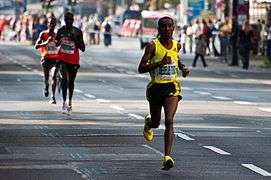
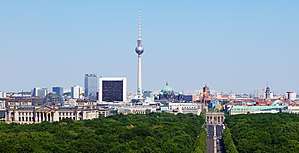
The course within the metropolis starts and finishes near the Brandenburg Gate. Because of the division of the city, the marathon events before 1990 were limited to the area of West Berlin. Only on 30 September 1990, were athletes able to run through the Brandenburg Gate and the unified city saw its first race running through both halves. It was reported that a great many of the runners had tears in their eyes as they ran through the gate.[7]
Nowadays, after leaving Brandenburg Gate, the course passes Charlottenburg, around Tiergarten, along Moabit and Mitte, and then south to Friedrichshain. After that, it winds west between Kreuzberg and Neukölln, through Schöneberg, over to Friedenau and Zehlendorf, before turning north back toward the city's center. Looping above Schöneberg, the course comes full circle as it finishes through the Gate.[7]
On different routes there have been two major international marathons at the 1936 Olympic Games and 2009 IAAF World Championships. Also Ulrich Hutmacher (GER) won a marathon in Berlin on 14 Oct 1973 with a time of 2:19:32 but that race is not considered part of this series.
Sponsors
There have been several title sponsors in the race's history. From 1974 until 1989 it was just the Berlin Marathon. In 1990 it was the Yanase Berlin Marathon. In 1991 and 1992 it was the Canon Berlin Marathon. It reverted to simply the Berlin Marathon from 1993 until 1997. It then became the Alberto Berlin Marathon in 1998 and 1999. A new title sponsor changed the name to real,- Berlin Marathon from 2000–2010. Finally this has been the BMW Berlin Marathon since 2011.
Finishers
In terms of finishing athletes Berlin is one of four world-wide marathons with more than 40,000 finishers, along with the New York City Marathon, Chicago Marathon, and Paris Marathon.
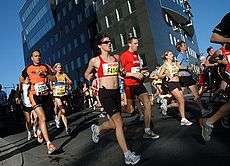
| Year | Finishers | Shares | |||
|---|---|---|---|---|---|
| Total | Males | Females | Males | Females | |
| 2020 | cancelled due to coronavirus pandemic | ||||
| 2019 | 44,064 | 30,775 | 13,289 | 70% | 30% |
| 2018 | 40,775 | 28,443 | 12,332 | 70% | 30% |
| 2017 | 39,101 | 28,067 | 11,034 | 72% | 28% |
| 2016 | 36,054 | 26,807 | 9,247 | 74% | 26% |
| 2015 | 36,767 | 27,917 | 8,929 | 76% | 24% |
| 2014 | 28,946 | 22,178 | 6,768 | 77% | 23% |
| 2013 | 36,527 | 27,577 | 8,990 | 75% | 25% |
| 2012 | 34,377 | 26,398 | 7,871 | 77% | 23% |
| 2011 | 32,977 | 25,577 | 7,414 | 77% | 23% |
| 2010 | 34,070 | 26,410 | 7,215 | 78% | 22% |
| 2009 | 35,016 | 27,934 | 7,060 | 79% | 21% |
| 2008 | 35,653 | 28,357 | 7,429 | 79% | 21% |
| 2007 | 32,497 | 25,994 | 6,492 | 80% | 20% |
| 2006 | 30,190 | 24,094 | 6,088 | 80% | 20% |
| 2005 | 30,382 | 24,501 | 5,872 | 81% | 19% |
| 2004 | 28,023 | 22,800 | 5,222 | 81% | 19% |
| 2003 | 30,709 | 25,108 | 5,601 | 82% | 18% |
| 2002 | 25,286 | 20,880 | 4,406 | 83% | 17% |
| 2001 | 25,792 | 21,669 | 4,123 | 84% | 16% |
| 2000 | 22,879 | 19,332 | 3,547 | 84% | 16% |
| 1999 | 19,129 | 16,537 | 2,592 | 87% | 13% |
| 1998 | 21,004 | 17,795 | 3,209 | 85% | 15% |
| 1997 | 14,982 | 13,120 | 1,862 | 88% | 12% |
| 1996 | 16,529 | 14,489 | 2,040 | 88% | 12% |
| 1995 | 13,088 | 11,682 | 1,406 | 89% | 11% |
| 1994 | 12,263 | 10,980 | 1,283 | 90% | 10% |
| 1993 | 14,107 | 12,586 | 1,521 | 89% | 11% |
| 1992 | 13,225 | 11,918 | 1,307 | 90% | 10% |
| 1991 | 14,849 | 13,456 | 1,393 | 91% | 9% |
| 1990 | 22,806 | 20,415 | 2,391 | 90% | 10% |
| 1989 | 13,433 | 12,233 | 1,200 | 91% | 9% |
| 1988 | 13,117 | 11,986 | 1,131 | 91% | 9% |
| 1987 | 12,674 | 11,651 | 1,023 | 92% | 8% |
| 1986 | 11,450 | 10,574 | 876 | 92% | 8% |
| 1985 | 9,810 | 9,146 | 664 | 93% | 7% |
| 1984 | 7,297 | 6,875 | 422 | 94% | 6% |
| 1983 | 5,121 | 4,886 | 235 | 95% | 5% |
| 1982 | 3,448 | 3,318 | 130 | 96% | 4% |
| 1981 | 2,567 | 2,418 | 149 | 94% | 6% |
| 1980 | 294 | 276 | 18 | 94% | 6% |
| 1979 | 222 | 207 | 15 | 93% | 7% |
| 1978 | 197 | 187 | 10 | 95% | 5% |
| 1977 | 230 | 219 | 11 | 95% | 5% |
| 1976 | 311 | 296 | 15 | 95% | 5% |
| 1975 | 236 | 232 | 4 | 98% | 2% |
| 1974 | 244 | 234 | 10 | 96% | 4% |
Elite race
World records
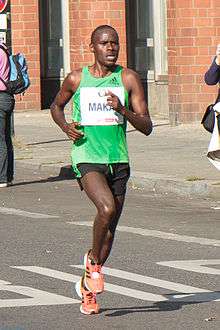
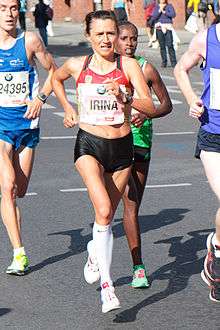
| Year | Athlete | Country | Record | Sex |
|---|---|---|---|---|
| 2018 | Eliud Kipchoge | 2:01:39 | Men | |
| 2014 | Dennis Kipruto Kimetto | 2:02:57 | Men | |
| 2013 | Wilson Kipsang Kiprotich | 2:03:23 | Men | |
| 2011 | Patrick Makau Musyoki | 2:03:38 | Men | |
| 2008 | Haile Gebrselassie | 2:03:59 | Men | |
| 2007 | Haile Gebrselassie | 2:04:26 | Men | |
| 2003 | Paul Tergat | 2:04:55 | Men | |
| 2001 | Naoko Takahashi | 2:19:46 | Women | |
| 1999 | Tegla Loroupe | 2:20:43 | Women | |
| 1998 | Ronaldo da Costa | 2:06:05 | Men | |
| 1977 | Christa Vahlensieck | 2:34:48 | Women |
Winners
Key:
- Current course record
- German championship race
| Edition | Date | Men's winner | Country | Time[lower-alpha 1] | Women's winner | Country | Time[lower-alpha 1] |
|---|---|---|---|---|---|---|---|
| 2020 edition cancelled due to coronavirus pandemic | |||||||
| 46 | 29 September 2019 | Kenenisa Bekele | 2:01:41 | Ashete Bekere | 2:20:14 | ||
| 45 | 16 September 2018 | Eliud Kipchoge | 2:01:39 WR | Gladys Cherono | 2:18:11 | ||
| 44 | 24 September 2017 | Eliud Kipchoge | 2:03:32 | Gladys Cherono | 2:20:23 | ||
| 43 | 25 September 2016 | Kenenisa Bekele | 2:03:03 | Aberu Kebede | 2:20:45 | ||
| 42 | 27 September 2015 | Eliud Kipchoge | 2:04:00 | Gladys Cherono | 2:19:25 | ||
| 41 | 28 September 2014 | Dennis Kimetto | 2:02:57 WR | Tirfi Tsegaye | 2:20:18 | ||
| 40 | 29 September 2013 | Wilson Kipsang | 2:03:23 WR | Florence Kiplagat | 2:21:13 | ||
| 39 | 30 September 2012 | Geoffrey Mutai | 2:04:15 | Aberu Kebede | 2:20:30 | ||
| 38 | 25 September 2011 | Patrick Musyoki | 2:03:38 WR | Florence Kiplagat | 2:19:44 | ||
| 37 | 26 September 2010 | Patrick Musyoki | 2:05:08 | Aberu Kebede | 2:23:58 | ||
| 36 | 20 September 2009 | Haile Gebrselassie | 2:06:08 | Atsede Habtamu | 2:24:47 | ||
| 35 | 28 September 2008 | Haile Gebrselassie | 2:03:59 WR | Irina Mikitenko | 2:19:19 | ||
| 34 | 30 September 2007 | Haile Gebrselassie | 2:04:26 WR | Gete Wami | 2:23:17 | ||
| 33 | 24 September 2006 | Haile Gebrselassie | 2:05:56 | Gete Wami | 2:21:34 | ||
| 32 | 25 September 2005 | Philip Manyim | 2:07:41 | Mizuki Noguchi | 2:19:12 | ||
| 31 | 26 September 2004 | Felix Limo | 2:06:44 | Yoko Shibui | 2:19:41 | ||
| 30 | 28 September 2003 | Paul Tergat | 2:04:55 WR | Yasuko Hashimoto | 2:26:32 | ||
| 29 | 29 September 2002 | Raymond Kipkoech | 2:06:47 | Naoko Takahashi | 2:21:49 | ||
| 28 | 30 September 2001 | Joseph Ngolepus | 2:08:47 | Naoko Takahashi | 2:19:46 WR | ||
| 27 | 10 September 2000 | Simon Biwott | 2:07:42 | Kazumi Matsuo | 2:26:15 | ||
| 26 | 26 September 1999 | Josephat Kiprono | 2:06:44 | Tegla Loroupe | 2:20:43 WR | ||
| 25 | 20 September 1998 | Ronaldo da Costa | 2:06:05 WR | Marleen Renders | 2:25:22 | ||
| 24 | 28 September 1997 | Elijah Lagat | 2:07:41 | Catherina McKiernan | 2:23:44 | ||
| 23 | 29 September 1996 | Abel Antón | 2:09:15 | Colleen De Reuck | 2:26:35 | ||
| 22 | 24 September 1995 | Sammy Lelei | 2:07:02 | Uta Pippig | 2:25:37 | ||
| 21 | 25 September 1994 | António Pinto | 2:08:31 | Katrin Dörre-Heinig | 2:25:15 | ||
| 20 | 26 September 1993 | Xolile Yawa | 2:10:57 | Renata Kokowska | 2:26:20 | ||
| 19 | 27 September 1992 | David Tsebe | 2:08:07 | Uta Pippig | 2:30:22 | ||
| 18 | 29 September 1991 | Steve Brace | 2:10:57 | Renata Kokowska | 2:27:36 | ||
| 17 | 30 September 1990 | Steve Moneghetti | 2:08:16 | Uta Pippig | 2:28:37 | ||
| 16 | 1 October 1989 | Alfredo Shahanga | 2:10:11 | Päivi Tikkanen | 2:28:45 | ||
| 15 | 9 October 1988 | Suleiman Nyambui | 2:11:45 | Renata Kokowska | 2:29:16 | ||
| 14 | 4 October 1987 | Suleiman Nyambui | 2:11:11 | Kerstin Preßler | 2:31:22 | ||
| 13 | 28 September 1986 | Bogusław Psujek | 2:11:03 | Charlotte Teske | 2:32:10 | ||
| 12 | 29 September 1985 | Jimmy Ashworth | 2:11:43 | Magda Ilands | 2:34:10 | ||
| 11 | 30 September 1984 | John Skovbjerg | 2:13:35 | Ágnes Sipka | 2:39:32 | ||
| 10 | 25 September 1983 | Karel Lismont | 2:13:37 | Karen Holdsworth | 2:40:32 | ||
| 9 | 26 September 1982 | Domingo Tibaduiza | 2:14:47 | Jean Lochhead | 2:47:05 | ||
| 8 | 27 September 1981 | Ian Ray | 2:15:42 | Angelika Stephan | 2:47:24 | ||
| 7 | 28 September 1980 | Ingo Sensburg | 2:16:48 | Gerlinde Püttmann | 2:47:18 | ||
| 6 | 30 September 1979 | Ingo Sensburg | 2:21:09 | Jutta von Haase | 3:07:07 | ||
| 5 | 3 September 1978 | Michael Spöttel | 2:20:03 | Ursula Blaschke | 2:57:09 | ||
| 4 | 10 September 1977 | Günter Mielke | 2:15:19 | Christa Vahlensieck | 2:34:48 WR | ||
| 3 | 26 September 1976 | Ingo Sensburg | 2:23:08 | Jutta von Haase | 3:05:19 | ||
| 2 | 28 September 1975 | Ralf Bochröder | 2:47:08 | Kristin Bochröder | 2:59:15 | ||
| 1 | 13 October 1974 | Günter Hallas | 2:44:53 | Jutta von Haase | 3:22:01 | ||
In-line skating race
An in-line skating section was added to the marathon event in 1997. A total of 5081 people took part in this section in the 2019 race. It is considered the largest inline skater marathon in the world and is the final venue of the World Inline Cup. The men's and women's race records are held by Bart Swings (56:49 in 2015) and Maira Yaqueline Arias (1:06:35 in 2017).
| Year | Men's winner | Country | Time[lower-alpha 1] | Women's winner | Country | Time[lower-alpha 1] |
|---|---|---|---|---|---|---|
| 2020 | cancelled due to coronavirus pandemic | |||||
| 2019 | Felix Rijhnen | 1:10:30 | Sandrine Tas | 1:25:49 | ||
| 2018 | Bart Swings | 57:58 | Katharina Rumpus | 1:09:15 | ||
| 2017 | Bart Swings | 58:42 | Maira Yaqueline Arias | 1:06:35 | ||
| 2016 | Bart Swings | 59:59 | Manon Kamminga | 1:08:38 | ||
| 2015 | Bart Swings | 56:49 | Sandrine Tas | 1:09:20 | ||
| 2014 | Bart Swings | 59:59 | Manon Kamminga | 1:08:38 | ||
| 2013 | Bart Swings | 59:28 | Manon Kamminga | 1:09:58 | ||
| 2012 | Ewen Fernandez | 1:00:04 | Sabine Berg | 1:14:13 | ||
| 2011 | Ewen Fernandez | 1:01:26 | Sabine Berg | 1:14:56 | ||
| 2010 | Severin Widmer | 1:09:19 | Giovanna Turchiarelli | 1:22:25 | ||
| 2009 | Luca Saggiorato | 1:02:50 | Cecilia Baena | 1:14:47 | ||
| 2008 | Joey Mantia | 1:00:33 | Cecilia Baena | 1:13:24 | ||
| 2007 | Nicolas Iten | 1:12:30 | Hilde Goovaerts | 1:23:20 | ||
| 2006 | Luca Saggiorato | 1:02:25 | Giovanna Turchiarelli | 1:14:02 | ||
| 2005 | Luca Saggiorato | 1:01:21 | Brigitte Méndez | 1:10:43 | ||
| 2004 | Roger Schneider | 1:04:43 | Cecilia Baena | 1:17:08 | ||
| 2003 | Juan Carlos Betancur | 1:02:03 | Julie Glass | 1:11:28 | ||
| 2002 | Juan Carlos Betancur | 1:04:44 | Angèle Vaudan | 1:13:59 | ||
| 2001 | Arnaud Gicquel | 1:04:17 | Sheila Herrero | 1:12:57 | ||
| 2000 | Chad Hedrick | 1:01:45 | Angèle Vaudan | 1:08:29 | ||
| 1999 | Tristan Loy | 1:01:08 | Anne Titze | 1:09:32 | ||
| 1998 | Johann Langenberg | 1:07:32 | Caroline Lagree | 1:14:20 | ||
| 1997 | Pascal Briand | 1:07:52 | Caroline Jean | 1:15:30 | ||
Handcycle race
A handcycle race was first held at the race in 2004. In 2008, 166 handcyclists participated in the Berlin Marathon. The men's and women's race records are held by Jetze Plat (1:00:01 in 2019) and Christiane Reppe (1:08:54 in 2016).
Key: Course record
| Year | Men's winner | Time[lower-alpha 1] | Women's winner | Time[lower-alpha 1] |
|---|---|---|---|---|
| 2004 | 1:17:02 | 1:24:43 | ||
| 2005 | 1:13:32 | 1:15:50 | ||
| 2006 | 1:11:03 | 1:18:34 | ||
| 2007 | 1:11:12 | 1:18:40 | ||
| 2008 | 1:05:46 | 1:13:55 | ||
| 2009 | 1:05:47 | 1:18:28 | ||
| 2010 | 1:09:04 | 1:25:13 | ||
| 2011 | 1:04:12 | 1:17:09 | ||
| 2012 | 1:05:21 | 1:17:42 | ||
| 2013 | 1:06:14 | 1:15:31 | ||
| 2014 | 1:03:37 | 1:10:23 | ||
| 2015 | 1:02:32 | 1:10:12 | ||
| 2016 | 1:05:06 | 1:08:54 | ||
| 2017 | 1:03:45 | 1:10:07 | ||
| 2018 | 1:04:56 | 1:17:36 | ||
| 2019 | 1:00:01 | 1:10:21 | ||
| 2020 | cancelled due to coronavirus pandemic | |||
Wheelchair race
A wheelchair section was first officially held at the Berlin Marathon in 1981. Only men competed that year. The wheelchair race typically starts earlier in the day before the runners and power walkers.
Heinz Frei is the most successful athlete with twenty wins in the men's race. The next most successful athlete is Manuela Schär, who has won the women's race six times. Both these athletes also hold the records for time, with Frei setting the men's race record of 1:21:39 in 1997 and Schär setting the women's race record of 1:36:53 in 2018.[8]
Key: Course record
| Year | Men's winner | Time[lower-alpha 1] | Women's winner | Time[lower-alpha 1] |
|---|---|---|---|---|
| 1981 | 2:08:44 | not held | ||
| 1982 | 2:03:10 | |||
| 1983 | 1:55:10 | 2:51:12 | ||
| 1984 | 2:16:32 | 2:47:14 | ||
| 1985 | 1:57:28 | 2:33:51 | ||
| 1986 | 1:46:44 | 2:32:23 | ||
| 1987 | 1:46:52 | 2:21:29 | ||
| 1988 | 1:52:08 | 2:52:29 | ||
| 1989 | 1:40:11 | 1:55:23 | ||
| 1990 | 1:34:41 | 1:57:47 | ||
| 1991 | 1:27:39 | 1:51:50 | ||
| 1992 | 1:29:41 | 1:42:07 | ||
| 1993 | 1:27:16 | 1:50:34 | ||
| 1994 | 1:22:12 | 1:57:14 | ||
| 1995 | 1:22:49 | 1:58:38 | ||
| 1996 | 1:25:34 | 1:54:00 | ||
| 1997 | 1:21:39 | 1:49:58 | ||
| 1998 | 1:24:19 | 1:47:53 | ||
| 1999 | 1:23:57 | 1:48:12 | ||
| 2000 | 1:26:30 | 1:52:31 | ||
| 2001 | 1:30:24 | 1:47:46 | ||
| 2002 | 1:28:28 | 1:45:52 | ||
| 2003 | 1:25:19 | 1:52:05 | ||
| 2004 | 1:33:49 | not held | ||
| 2005 | 1:28:32 | 1:49:46 | ||
| 2006 | 1:29:30 | 1:42:52 | ||
| 2007 | 1:26:50 | 1:48:50 | ||
| 2008 | 1:27:55 | 2:04:21 | ||
| 2009 | 1:28:38 | 1:39:31 | ||
| 2010 | 1:28:46 | 1:46:15 | ||
| 2011 | 1:29:31 | 1:45:20 | ||
| 2012 | 1:29:43 | 1:46:19 | ||
| 2013 | 1:31:00 | 1:41:39 | ||
| 2014 | 1:32:25 | 1:47:56 | ||
| 2015 | 1:27:36 | 1:50:36 | ||
| 2016 | 1:29:51 | 1:43:00 | ||
| 2017 | 1:29:03 | 1:40:05 | ||
| 2018 | 1:29:41 | 1:36:53 | ||
| 2019 | 1:28:09 | 1:38:07 | ||
| 2020 | cancelled due to coronavirus pandemic | |||
See also
References
- "Tag der Deutschen Einheit verdrängt Berlin-Marathon". Retrieved 2018-09-15.
- "Now a 3-Time Champ, Cherono Adds Course Record to Berlin Marathon Resume". Runner's World. 2018-09-16. Retrieved 2018-09-28.
- Robinson, Roger (25 September 2019). "The Record-Breaking History of the Berlin Marathon". Runner's World. Retrieved 7 July 2020.
- "Countdown is starting: Looking back into the history of the BMW BERLIN MARATHON". BMW BERLIN MARATHON. 9 January 2013. Retrieved 7 July 2020.
- https://www.scc-events.com/en/corporate/events/event-update.html
- https://web.archive.org/web/20200701133145/https://www.bmw-berlin-marathon.com/en/your-race/event-update/
- Marius Bakken. "Berlin Marathon". Retrieved 2009-04-17.
- 2018 Berlin Marathon. Berlin Marathon. Retrieved 2020-05-27.
External links
| Wikimedia Commons has media related to Berlin Marathon. |
- Official website

- World Marathon Majors – Berlin Marathon at the World Marathon Majors
- Berlin Marathon at YouRace – Interactive course map and elevation profile
